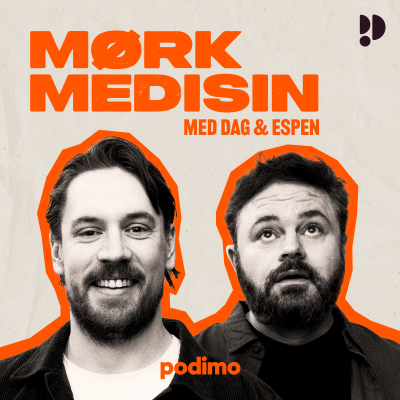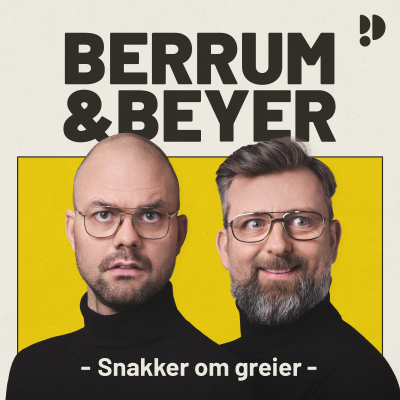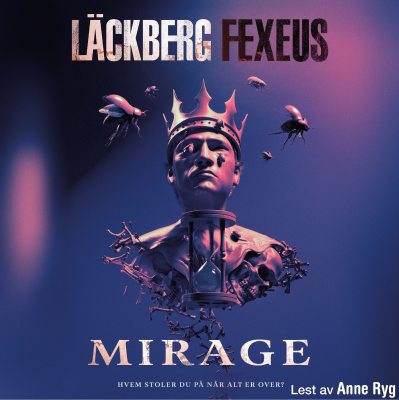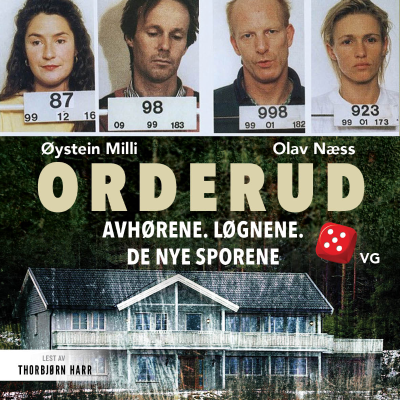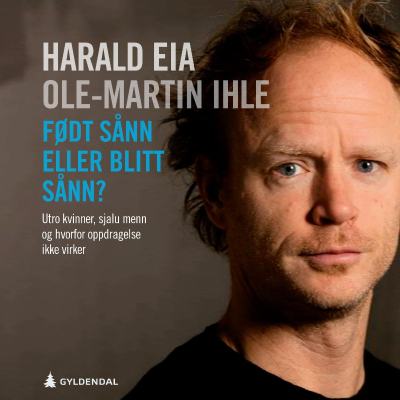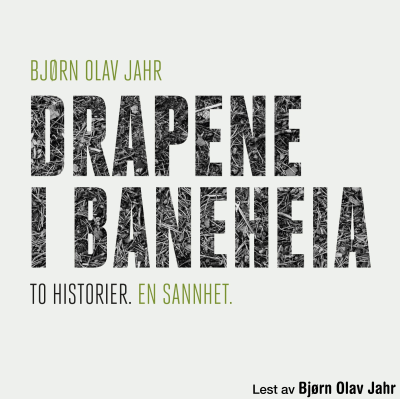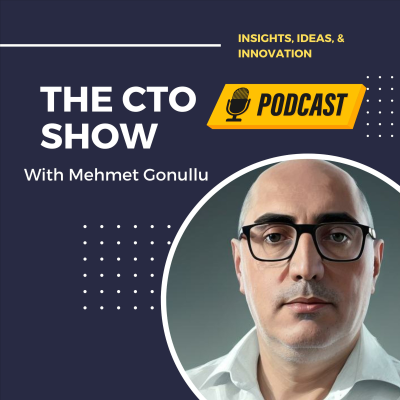
The CTO Show with Mehmet Gonullu
Podkast av Mehmet Gonullu
Prøv gratis i 14 dager
99 kr / Måned etter prøveperioden.Avslutt når som helst.
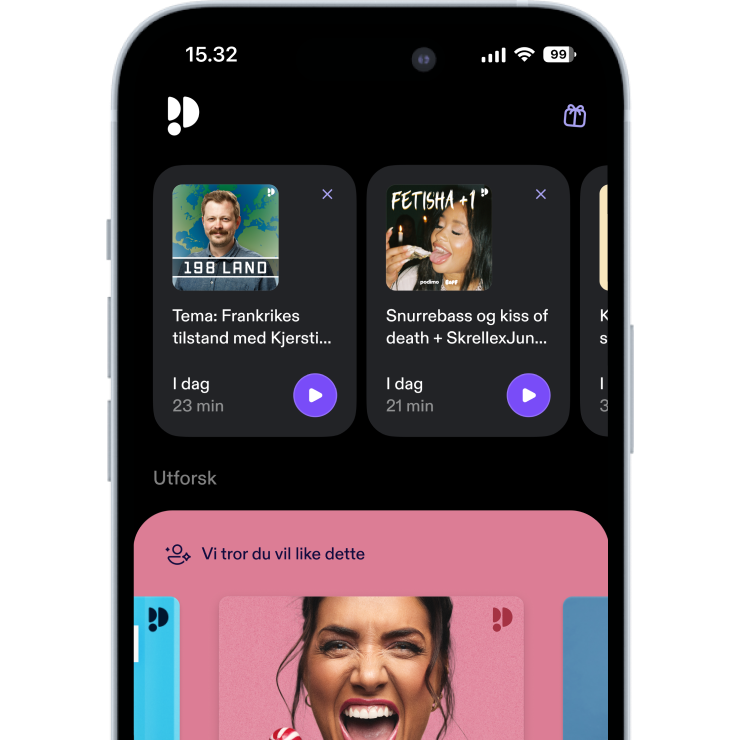
Mer enn 1 million lyttere
Du vil elske Podimo, og du er ikke alene
Rated 4.7 in the App Store
Les mer The CTO Show with Mehmet Gonullu
Broadcasting from Dubai, The CTO Show with Mehmet explores the latest trends in technology, startups, and venture funding. Host Mehmet Gonullu leads insightful discussions with thought leaders, innovators, and entrepreneurs from diverse industries. From emerging technologies to startup investment strategies, the show provides a balanced view on navigating the evolving landscape of business and tech, helping listeners understand their profound impact on our world. mehmet@yassiventures.com
Alle episoder
500 EpisoderIn this episode of The CTO Show with Mehmet, we sit down with Glen Cameron, founder and CEO of Bonded, to explore how technology can validate the most human thing we have: relationships. From immigration barriers to identity verification in a deepfake world, Glen unpacks the inspiration behind Bonded — a startup building proof-of-relationship infrastructure for the AI age. 🎯 Key Takeaways • The problem with traditional identity: it’s static and individual • Immigration systems still rely on analog evidence of relationships • Deepfakes and fraud are making it harder to prove authentic human ties • Bonded’s approach: blending AI, privacy-first design, and blockchain timestamping • The concept of “proof of human relationship” as a new digital primitive • Why self-sovereign identity must extend beyond individuals to relationships • Use cases beyond immigration: from border checks to creative rights and relational passports • Glen’s unique founder journey from global ad exec to protocol builder ⸻ 🎧 What You’ll Learn • How AI and blockchain can work together to solve real-world identity challenges • The unseen complexity behind relationship verification in immigration • Why “relational identity” may be the missing link in Web3 innovation • How Glen is building a platform that’s both deeply technical and radically human 👤 About the Guest Glen Cameron is the founder of Bonded and Together Alone Ventures, with a diverse background spanning global PR, branding, and deep tech innovation. A true global citizen, Glen has lived and worked in 15+ countries and is now building a Web3- and AI-enabled platform to bring dignity, trust, and speed to how we prove human connection in high-stakes processes like immigration, banking, and beyond. https://www.linkedin.com/in/glencameronpb/ [https://www.linkedin.com/in/glencameronpb/] https://www.bonded2.com/ [https://www.bonded2.com/] ⏱️ Episode Highlights 00:00 – Intro and how Mehmet and Glen met 02:00 – Glen’s personal immigration struggle that sparked Bonded 06:30 – Why traditional proof of relationships is broken 09:00 – Using AI + blockchain to build time-based, verifiable relational identity 13:30 – Starting from scratch: what if you’re already 45 years old? 16:00 – Privacy-first approach: user-owned data, kill switch, full control 18:30 – Getting immigration authorities to accept digital proof 21:00 – How Bonded structures evidence (scrollable timeline, triangulated proof) 23:30 – Border crossings, interrogation, and “proof in your pocket” 25:00 – Glen on why existing tech harvests data without helping users 27:00 – Expanding beyond immigration: traffic stops, IP rights, relational AI agents 30:00 – Why Web3 matters — and how Bonded avoids the hype traps 34:00 – Glen’s global career story and lessons from advertising to tech 41:00 – The rise of real use cases for relational protocols 44:00 – Fundraising, building responsibly, and going beyond MVP 47:00 – Final thoughts and how to get in touch with Glen
In this special 500th episode of The CTO Show with Mehmet, we dive deep into the talent game behind startup scaling and private equity moves. Joining us is Justin Dixon, founder of Hire Tomorrow, who brings nearly two decades of recruiting experience—from Fortune 500s to early-stage startups and PE-backed ventures. We explore how AI is disrupting (and complicating) hiring, why job security at big companies is a myth, and how to evaluate a startup as if you were a VC—even when you’re just looking for your next role. 🔑 Key Takeaways: • The shift from employee to founder mindset (and how Rich Dad Poor Dad started it all) • How startups can compete with Fortune 500s for top talent • Why private equity firms almost always replace the CFO post-acquisition • What startup job seekers should really evaluate (hint: think like a VC) • How AI is flooding hiring pipelines—and what that means for founders and recruiters • Why job security at big companies is often an illusion • How Justin uses AI as a “board of advisors” to sharpen his thinking • The underrated power of podcasting for network building and deal flow ⸻ 🎓 What You’ll Learn: • Practical hiring insights for both founders and job seekers • How to vet a startup before joining—beyond the hype • Trends shaping AI’s role in recruitment (and its limitations) • The human side of recruiting that AI can’t automate 👤 About the Guest: Founder of Hire Tomorrow, Justin Dixon brings a wealth of experience and passion to his business. With a career dedicated to the recruiting industry, Justin has effectively collaborated with companies of various sizes and across diverse industries, ranging from emerging startups to Fortune 500. In January 2020, he transitioned from his role as Head of Recruiting for a Wealth Management firm to establish Hire Tomorrow, dedicated to assisting Private Equity firms and Startups in finding the Right Talent to drive their success. Our focus extends across C-level roles, Sales, Marketing, Finance, and Technology, ensuring a comprehensive approach to fulfilling our clients' staffing needs. https://www.hiretomorrow.com/ [https://www.hiretomorrow.com/] https://www.linkedin.com/in/jmdixon15/ [https://www.linkedin.com/in/jmdixon15/] Episode Highlights (Timestamps): 00:00 – Introduction and Justin’s backstory 02:00 – Quitting a stable job to launch a recruiting firm 06:00 – Building financial freedom through entrepreneurship 08:30 – Working with private equity firms post-acquisition 13:00 – Why PE firms prioritize CFO replacements 15:00 – How startups can win talent over big companies 19:00 – What Justin looks for in a startup before recommending it 23:00 – Startup job seekers need a VC mindset 27:00 – How AI is disrupting hiring—and why it’s messy 33:00 – Why candidate experience is broken 37:00 – Limitations of AI interviews and hidden legal risks 41:00 – Why recruiters (and salespeople) won’t be replaced 43:00 – How podcasting builds network, not just visibility 46:00 – Wrap-up and how to reach Justin
In this episode of The CTO Show with Mehmet, host Mehmet Gonullu sits down with Karan Jain, Founder and CEO of NayaOne, to explore the broken state of enterprise tech adoption — and what it takes to fix it. With over two decades of experience in financial services and technology, Karan is on a mission to eliminate the painful 12-month vendor procurement cycles that cripple innovation in large institutions. NayaOne offers a powerful, secure platform that connects enterprises with technology vendors and enables real-time evaluation using synthetic data, workflow tooling, and curated testbeds. From regulated environments like banking and healthcare to emerging innovation hubs in MENA, this conversation dives deep into how enterprises can move faster without compromising trust, compliance, or outcomes. 💡 What You’ll Learn • Why most enterprises still take 6–12 months to validate a tech vendor • How NayaOne shortens this cycle to a few weeks with sandbox infrastructure and synthetic data • The role of AI urgency in transforming procurement culture • Why “measured” doesn’t have to mean “slow” in regulated industries • How enterprise buyers are beginning to embrace experimentation over perfection • Trends in enterprise AI use cases (contact centers, dev tooling, document workflows) • What MENA banks can learn from global innovation patterns — and where they’re leapfrogging ⸻ 🔑 Key Takeaways • 🧪 Proof-of-concept purgatory is real — but solvable with the right tools and mindset • ⏱ Speed is a competitive advantage, even in highly regulated sectors • 🤖 AI adoption requires a cultural shift, not just tools • 🌍 MENA is a region full of top-down innovation energy and emerging early adopters • 🧠 Enterprises must start thinking like platforms — not just buyers 👤 About Karan Jain • Founder & CEO of NayaOne [https://www.nayaone.com/] • Former exec in banking, wealth, capital markets • Passionate about transforming enterprise-vendor relationships and building tech infrastructure that accelerates delivery • Actively working with banks, insurers, governments, and regulators globally — including in the MENA region https://nayaone.com/ [https://nayaone.com/] https://www.linkedin.com/in/karanjainonline/ [https://www.linkedin.com/in/karanjainonline/] ⏱ Timestamps 00:00 – Intro 01:30 – Karan’s journey from banking to NayaOne 03:15 – The core problem: why vendor adoption is broken 05:40 – Industries most affected: finance, health, legal, public sector 07:10 – How NayaOne accelerates vendor evaluation with synthetic data 10:30 – Vendor vs. enterprise adoption mindsets 12:20 – Executives as the key stakeholders in tech adoption 14:40 – Why AI has forced enterprises to move faster 17:00 – NayaOne’s internal AI journey and infrastructure 20:15 – Agentic AI: hype vs. real use cases 23:45 – Why 70% of “AI agents” are just glorified automation 26:10 – Real enterprise AI use cases today 29:00 – The enterprise fear of missing out (FOMO) 31:10 – Lessons from neobanks and BNPL players 34:00 – The CVC use case: accelerating adoption within portfolios 36:20 – Expansion and innovation patterns in MENA 39:40 – Cultural nuance and early adopters in B2B 41:00 – Crossing the chasm in the MENA startup ecosystem 44:00 – Where to find Karan and learn more
In this episode, host Mehmet Gonullu welcomes back Dev Aditya, Co-Founder of OIAI by Otermans Institute [https://www.oiedu.co.uk], who returns nearly two years after his first appearance to share an extraordinary update: they’ve built an AI teacher that runs completely offline — even on a 2020 Android phone. From educating learners in refugee camps to scaling across 17 countries, Dev’s mission is clear: make AI-powered learning accessible to the 750 million people underserved by the internet and modern hardware. We explore the engineering breakthroughs, the philosophical pivots, and the global partnerships that are making it possible. 🔑 Key Takeaways: • Why offline, voice-first AI is a game changer for education in low-connectivity areas • How Dev’s team runs 3D avatar-based AI on edge devices from 2020 — without cloud inference • The reason they pivoted away from enterprise clients to return to their impact-driven mission • Why running AI for the marginalized means solving for both connectivity and hardware bottlenecks • Their ambitious goal: upskill 750M people by 2030 • The launch of an SDK for other organizations to embed their AI teaching system • Upcoming partnerships with African governments and UN bodies ⸻ 🎓 What You’ll Learn: • How to scale AI without relying on cloud infrastructure • What true digital inclusion looks like — beyond donations and broadband • The importance of philosophy and mission in product decisions • The future of immersive, voice-first learning experiences • How to build for constraint — and still scale globally 👤 About the Guest: Dev Aditya is the co-founder of OIAI by Otermans Institute. He’s known for launching the world’s first public-facing AI teachers well before ChatGPT entered the scene. Dev’s work focuses on democratizing education through AI and edge computing, bringing scalable, impactful learning to the most underserved populations. https://www.linkedin.com/in/dev-adityaofficial/ [https://www.linkedin.com/in/dev-adityaofficial/] https://www.portfolio.oiedu.co.uk/ [https://www.portfolio.oiedu.co.uk/] 00:00 – Welcome back, Dev Aditya & what’s changed since Episode 212 02:00 – From rural schools to refugee camps: The origin story 05:30 – Content vs. teacher: The real challenge in scaling learning 07:00 – The philosophical misstep and going back to the mission 09:40 – Monetizing impact: Lessons from enterprise and education 11:00 – Offline breakthrough: Running AI without internet 13:40 – Engineering feat: 3D avatar AI on Android 2020 phones 15:20 – Why bigger models don’t equal better outcomes 18:00 – Did open-source LLMs influence their vision? 21:00 – How they handle data, analytics & personalization offline 23:00 – No patents? Why they’re releasing an SDK instead 25:00 – The SEA Model: Skills, Efficiency, Accessibility 27:00 – Building voice-first digital experiences for the underserved 30:00 – VR + AI for marginalized learners? Already built 32:00 – Teaching entrepreneurship, not just STEM 34:30 – An AI teacher that remembers you 36:00 – What’s next: Kenya, Guinea-Bissau & São Tomé 38:00 – Final thoughts & how to get in touch with Dev
Raj Singh, VP of Product at Mozilla and a seasoned startup founder, joins The CTO Show with Mehmet to share a candid look into the evolution of building products—from the early days of AI to today’s GenAI-fueled solo founder wave. We dive into what vibe coding means, how big companies like Mozilla are tackling zero-to-one innovation, and why most startups fail—not because of the idea, but because the founders get tired. 🚀 Key Takeaways • Most startups fail in the messy middle, not the beginning or end • AI is shifting us from “doing the work” to “instructing the machine” • Vibe coding is enabling faster product iteration—but it still needs human judgment • Large companies often struggle with zero-to-one because of talent structure, risk aversion, and short conviction windows • Solo founders can thrive—if they manage their energy and support systems ⸻ 🎯 What You’ll Learn • How Raj defines product-market fit in the GenAI era • The new role of engineers and creators in the age of AI • How to build new products inside legacy organizations • When and how to pivot—without burning out • Why AI shouldn’t be the pitch—it should be the enabler 👤 About the Guest Raj is the VP of Product at Mozilla, leading new 0 to 1 product initiatives. He joined Mozilla in 2022 via the acquisition of his startup, Pulse, which developed AI meeting summarization models. Previously, Raj has been a repeat consumer-focused startup founder. He was Co-Founder and CEO of Tempo AI, a smart calendar acquired by Salesforce in 2015. He also co-founded AllTheCooks, which became the largest recipe community on Android before its acquisition by Cookpad. Earlier in his career, he served as VP of Business Development at Skyfire, a mobile browser acquired by Opera. Prior to this, Raj co-founded and exited startups in the ringtone, live video and college dating categories. https://linktr.ee/mobileraj [https://linktr.ee/mobileraj] Episode Highlights (Timestamps) 00:00 – Intro and Raj’s journey from founder to Mozilla 03:00 – Pattern recognition and founder gut-checks 06:15 – Why most startups are stuck in the messy middle 08:45 – Evolution of AI: from OpenCV to GenAI 11:20 – Vibe coding and the shift in creative workflows 13:40 – The 95% AI accuracy rule and human-in-the-loop design 16:00 – AI’s impact on growth hacking and customer acquisition 17:40 – Can solo founders really build unicorns? 20:00 – Trillion-dollar ambitions vs. billion-dollar thinking 21:30 – Building zero-to-one products inside Mozilla 25:00 – Why large companies struggle with innovation 29:00 – Culture, incentives, and the “conviction window” 33:00 – Pivoting: when to stick, when to switch 36:00 – The solo founder dilemma and founder loneliness 41:00 – Consumer AI: solving problems vs. chasing hype 44:00 – Final advice: execute your idea—don’t just think about it

Rated 4.7 in the App Store
Prøv gratis i 14 dager
99 kr / Måned etter prøveperioden.Avslutt når som helst.
Eksklusive podkaster
Uten reklame
Gratis podkaster
Lydbøker
20 timer i måneden



